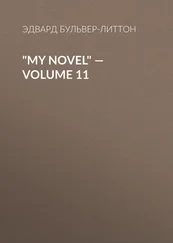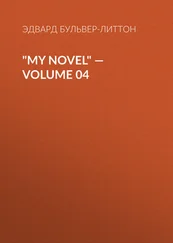Эдвард Бульвер-Литтон - My Novel — Complete
Здесь есть возможность читать онлайн «Эдвард Бульвер-Литтон - My Novel — Complete» — ознакомительный отрывок электронной книги совершенно бесплатно, а после прочтения отрывка купить полную версию. В некоторых случаях можно слушать аудио, скачать через торрент в формате fb2 и присутствует краткое содержание. Жанр: foreign_prose, literature_19, Европейская старинная литература, foreign_antique, на английском языке. Описание произведения, (предисловие) а так же отзывы посетителей доступны на портале библиотеки ЛибКат.
- Название:My Novel — Complete
- Автор:
- Жанр:
- Год:неизвестен
- ISBN:нет данных
- Рейтинг книги:5 / 5. Голосов: 1
-
Избранное:Добавить в избранное
- Отзывы:
-
Ваша оценка:
- 100
- 1
- 2
- 3
- 4
- 5
My Novel — Complete: краткое содержание, описание и аннотация
Предлагаем к чтению аннотацию, описание, краткое содержание или предисловие (зависит от того, что написал сам автор книги «My Novel — Complete»). Если вы не нашли необходимую информацию о книге — напишите в комментариях, мы постараемся отыскать её.
My Novel — Complete — читать онлайн ознакомительный отрывок
Ниже представлен текст книги, разбитый по страницам. Система сохранения места последней прочитанной страницы, позволяет с удобством читать онлайн бесплатно книгу «My Novel — Complete», без необходимости каждый раз заново искать на чём Вы остановились. Поставьте закладку, и сможете в любой момент перейти на страницу, на которой закончили чтение.
Интервал:
Закладка:
But now, after all, what was to be done? Jackeymo was much too proud to exhibit his person to the eyes of the squire’s butler in habiliments discreditable to himself and the padrone. In the midst of his perplexity the bell rang, and he went down into the parlour.
Riccabocca was standing on the hearth under his symbolical representation of the “Patriae Exul.”
“Giacomo,” quoth he, “I have been thinking that thou hast never done what I told thee, and fitted thyself out from my superfluities. But we are going now into the great world: visiting once begun, Heaven knows where it may stop. Go to the nearest town and get thyself clothes. Things are dear in England. Will this suffice?” And Riccabocca extended a five-pound note.
Jackeymo, we have seen, was more familiar with his master than we formal English permit our domestics to be with us; but in his familiarity he was usually respectful. This time, however, respect deserted him.
“The padrone is mad!” he exclaimed; “he would fling away his whole fortune if I would let him. Five pounds English, or a hundred and twenty-six pounds Milanese! Santa Maria! unnatural father! And what is to become of the poor signorina? Is this the way you are to marry her in the foreign land?”
“Giacomo,” said Riccabocca, bowing his head to the storm, “the signorina to-morrow; to-day the honour of the House. Thy small-clothes, Giacomo,—miserable man, thy small-clothes!”
“It is just,” said Jackeymo, recovering himself, and with humility; “and the padrone does right to blame me, but not in so cruel a way. It is just,—the padrone lodges and boards me, and gives me handsome wages, and he has a right to expect that I should not go in this figure.”
“For the board and the lodgment, good,” said Riccabocca. “For the handsome wages, they are the visions of thy fancy!”
“They are no such thing,” said Jackeymo, “they are only in arrear. As if the padrone could not pay them some day or other; as if I was demeaning myself by serving a master who did not intend to pay his servants! And can’t I wait? Have I not my savings too? But be cheered, be cheered; you shall be contented with me. I have two beautiful suits still. I was arranging them when you rang for me. You shall see, you shall see.”
And Jackeymo hurried from the room, hurried back into his own chamber, unlocked a little trunk which he kept at his bed-head, tossed out a variety of small articles, and from the deepest depth extracted a leathern purse. He emptied the contents on the bed. They were chiefly Italian coins, some five-franc pieces, a silver medallion inclosing a little image of his patron saint,—San Giacomo,—one solid English guinea, and somewhat more than a pound’s worth in English silver. Jackeymo put back the foreign coins, saying prudently, “One will lose on them here;” he seized the English coins, and counted them out. “But are you enough, you rascals?” quoth he, angrily, giving them a good shake. His eye caught sight of the medallion,—he paused; and after eying the tiny representation of the saint with great deliberation, he added, in a sentence which he must have picked up from the proverbial aphorisms of his master,—
“What’s the difference between the enemy who does not hurt me, and the friend who does not serve me? Monsignore San Giacomo, my patron saint, you are of very little use to me in the leathern bag; but if you help me to get into a new pair of small-clothes on this important occasion, you will be a friend indeed. Alla bisogna, Monsignore.” Then, gravely kissing the medallion, he thrust it into one pocket, the coins into the other, made up a bundle of the two defunct suits, and muttering to himself, “Beast, miser, that I am, to disgrace the padrone with all these savings in his service!” ran downstairs into his pantry, caught up his hat and stick, and in a few moments more was seen trudging off to the neighbouring town of L————.
Apparently the poor Italian succeeded, for he came back that evening in time to prepare the thin gruel which made his master’s supper, with a suit of black,—a little threadbare, but still highly respectable,—two shirt fronts, and two white cravats. But out of all this finery, Jackeymo held the small-clothes in especial veneration; for as they had cost exactly what the medallion had sold for, so it seemed to him that San Giacomo had heard his prayer in that quarter to which he had more exclusively directed the saint’s direction. The other habiliments came to him in the merely human process of sale and barter; the small-clothes were the personal gratuity of San Giacomo!
CHAPTER VIII
Life has been subjected to many ingenious comparisons; and if we do not understand it any better, it is not for want of what is called “reasoning by illustration.” Amongst other resemblances, there are moments when, to a quiet contemplator, it suggests the image of one of those rotatory entertainments commonly seen in fairs, and known by the name of “whirligigs,” or “roundabouts,” in which each participator of the pastime, seated on his hobby, is always apparently in the act of pursuing some one before him, while he is pursued by some one behind. Man, and woman too, are naturally animals of chase; the greatest still find something to follow, and there is no one too humble not to be an object of prey to another. Thus, confining our view to the village of Hazeldean, we behold in this whirligig Dr. Riccabocca spurring his hobby after Lenny Fairfield; and Miss Jemima, on her decorous side-saddle, whipping after Dr. Riccabocca. Why, with so long and intimate a conviction of the villany of our sex, Miss Jemima should resolve upon giving the male animal one more chance of redeeming itself in her eyes, I leave to the explanation of those gentlemen who profess to find “their only books in woman’s looks.” Perhaps it might be from the over-tenderness and clemency of Miss Jemima’s nature; perhaps it might be that as yet she had only experienced the villany of man born and reared in these cold northern climates, and in the land of Petrarch and Romeo, of the citron and myrtle, there was reason to expect that the native monster would be more amenable to gentle influences, less obstinately hardened in his iniquities. Without entering further into these hypotheses, it is sufficient to say that, on Signor Riccabocca’s appearance in the drawing-room at Hazeldean, Miss Jemima felt more than ever rejoiced that she had relaxed in his favour her general hostility to men. In truth, though Frank saw something quizzical in the old-fashioned and outlandish cut of the Italian’s sober dress; in his long hair, and the chapeau bras, over which he bowed so gracefully, and then pressed it, as if to his heart, before tucking it under his arm, after the fashion in which the gizzard reposes under the wing of a roasted pullet,—yet it was impossible that even Frank could deny to Riccabocca that praise which is due to the air and manner of an unmistakable gentleman. And certainly as, after dinner, conversation grew more familiar, and the parson and Mrs. Dale, who had been invited to meet their friend, did their best to draw him out, his talk, though sometimes a little too wise for his listeners, became eminently animated and agreeable. It was the conversation of a man who, besides the knowledge which is acquired from books and life, had studied the art which becomes a gentleman,—that of pleasing in polite society.
The result was that all were charmed with him; and that even Captain Barnabas postponed the whist-table for a full hour after the usual time. The doctor did not play; he thus became the property of the two ladies, Miss Jemima and Mrs. Dale.
Seated between the two, in the place rightfully appertaining to Flimsey, who this time was fairly dislodged, to her great wonder and discontent, the doctor was the emblem of true Domestic Felicity, placed between Friendship and Love.
Читать дальшеИнтервал:
Закладка:
Похожие книги на «My Novel — Complete»
Представляем Вашему вниманию похожие книги на «My Novel — Complete» списком для выбора. Мы отобрали схожую по названию и смыслу литературу в надежде предоставить читателям больше вариантов отыскать новые, интересные, ещё непрочитанные произведения.
Обсуждение, отзывы о книге «My Novel — Complete» и просто собственные мнения читателей. Оставьте ваши комментарии, напишите, что Вы думаете о произведении, его смысле или главных героях. Укажите что конкретно понравилось, а что нет, и почему Вы так считаете.












